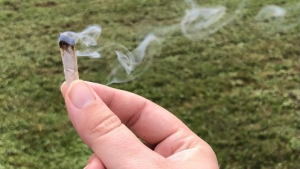News
Applications coming in for Ohio medical marijuana shops that want to sell recreational pot
By: Karen Kasler | Statehouse News Bureau
Posted on:
COLUMBUS, Ohio (Statehouse News Bureau) — Medical marijuana dispensaries in Ohio that want to sell to recreational users can now apply for dual licenses. That brings the state closer to legal marijuana sales to adults in Ohio, which haven’t been allowed under November’s voter-approved law that legalized usage and possession and home growing of up to 12 pot plants per household.

Tom Haren with the Ohio Cannabis Coalition, which represents marijuana businesses. He said there isn’t a specific date that sales will start.
“It sort of depends on how quickly the division of cannabis control processes processes these applications and how quickly the license holders themselves are able to begin selling to Ohio adults,” Haren said. “Some licensees may want to take some more time to do modifications at their site or to make some changes. Others will be ready closer to that the first day that they’re able to to start selling. So it’ll be a little bit of a rolling process.”
The process is different for brand-new businesses that want to sell legal marijuana products.
They need to apply for a 10(B) license, and those applications were also posted Friday. Those businesses have to pay a non-refundable $5,000 fee and must submit applications by June 14. A drawing will be held by the Ohio Lottery on June 21, and the businesses selected in that drawing can proceed to the next step of the process, which is phase one of site selection starting on July 1. All 10(B) licenses will also be awarded by Sept. 7.
More than 50 Ohio communities have banned new shops. Haren said he thinks they’ll be hurt by that decision.
“It is concerning because what that means is that those cities will not have the opportunity to take advantage of the new tax revenue that will be generated under the adult use program,” Haren said. “People who live in those communities will still use adult use cannabis products. They just will have to go to another town and generate tax revenue in that town when they make their purchases.”
Haren served as the spokesperson for the Coalition to Regulate Marijuana Like Alcohol, the group that brought Issue 2 to the ballot last fall. The businesses he’s working with expect widespread interest in legal marijuana sales, but not necessarily the lines that marked the first few days of medical marijuana sales in January 2019.
“To the extent there are lines, I don’t expect that to be a long lived phenomenon,” Haren said. “As more and more of these dispensaries begin converting from medical only to dual use, the choices that consumers have will continue to grow and supply will continue to ramp up.”
The Coalition to Regulate Marijuana Like Alcohol had touted an estimate by Ohio State University’s Drug Enforcement and Policy Center showing the state could rake in an extra $218 million in tax revenue the first year alone. And by the fifth year, the 10% excise tax on marijuana could mean up to $404 million.
State lawmakers haven’t passed any changes to the language in Issue 2, which allows 12 home-grown plants per household and a 10% tax with that revenue going to social equity and jobs programs, education and treatment for addiction and administrative costs. A bill passed by the Senate in December to cut the number of home-grown plants to six and to raise the tax rate while also changing where the revenue goes has not been taken up by the House.
Two Republicans senators have introduced a new bill to make changes and to ban delta-8, also known as “intoxicating hemp”. Gov. Mike DeWine has asked lawmakers to ban it, since it’s not covered by existing marijuana laws.

